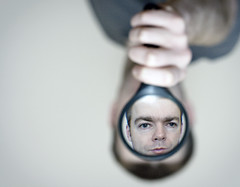When we start learning photography, first let us understand basic jargon's and terms used in and around the industry. let us start with focal length.
Here is an extract from the professional photographer Tom Hill in his blog explaining what is focal length.
The focal length of a lens refers to the actual length of the lens from a point inside its front lens element to the point where it comes to focus -- in our case, that is on the camera sensor -- when the lens is focused at infinity. Modern optical systems and zooms can make this calculation more exacting, but this definition is sufficient to understanding the elementary difference between lenses and how to use them creatively. Focal length is typically expressed in millimeters for modern DSLR lenses.
What we call a "normal" lens is one where the focal length is approximately equal to the diagonal of the sensor plane. On a full-frame (35mm) sensor that would be a 50mm lens. On the smaller APS sized sensor that would be a 35mm lens. All other focal length categories are given relative to what is "normal".
For instance, a wide angle lens is one that is wider that a normal lens, while a telephoto lens is longer than a normal lens.
Wide angle lenses take in a larger visual area that makes them most suitable for wide landscapes, while telephotos act more like telescopes for close-up viewing of distant subjects. These are the obvious, practical reasons for selecting one focal length over another. More importantly, however, are the creative characteristics each focal length has.
If you’re trying to decide which lens to buy, here are some questions that you should answer (on your own) before you decide to go to the camera store.
1. What is your current skill level? Are you a raw beginner or advanced amateur? What are your goals? Do you want to turn pro or just shoot family photos? The advice I would give to someone buying their very first serious camera lens would sometimes be different than it would for someone who’s been at this five years. Pros need lenses with wide (fast apertures) etc.
2. What subjects do you like to photograph? The lens I’d suggest for photographing birds is very different than the one I’d suggest for a food photographer. Some subjects require long lenses (like sports and wildlife.) Other subjects like architecture require very wide lenses.
3. Will you primarily be shooting indoors or outside? If you’re shooting mostly indoors you’ll have to consider a faster lens than if you’ll just be shooting outdoors. Unfortunately, faster lenses cost more. But if you can’t or won’t use flash, super wide apertures are going to be important to you.
4. How much money do you want to spend? Lenses are like most things – you get what you pay for. Knowing how much you want to spend will often have a big influence on what I’d recommend. I personally think the lens is more important than the camera body – in some cases. It’s sort of like stereo equipment. Every genuine expert in that field I’ve spoken with says to spend the money on speakers. Here, I’d suggest spending the money on glass.
5. How long will you keep the lens? If you turn your gear over frequently, it might make sense to go with something less expensive than if you plan to use the lens over the entire length of your career. If you are the kind of person who hangs on to everything you buy, save your pennies and buy the best.
6. How strong are you? Weight (and size) are important factors in lens choice. I know many photographers who were very excited to get a Nikon 200-400 F/4 lens until they actually had to hold it. The thing is a beast. Are you prepared to carry whatever lens(es) you buy? It’s a shame to buy a lens and then not use it because it’s too much of a hassle to carry it.
7. Which is most important? Price, quality, durability? An old businessman taught me a very important lesson early in life. You can have it good, fast or cheap. Pick any two.
Well i guess you got some basic idea about focal length. lets have some break till we comeback with more detailed post about focal length. meanwhile i recommend you to go through some of the articles recommended below (external links of course).



